Unit 2 I'll help to clean up the city parks. Section A 精讲课件(共46张PPT)+内嵌音频
文档属性
| 名称 | Unit 2 I'll help to clean up the city parks. Section A 精讲课件(共46张PPT)+内嵌音频 | 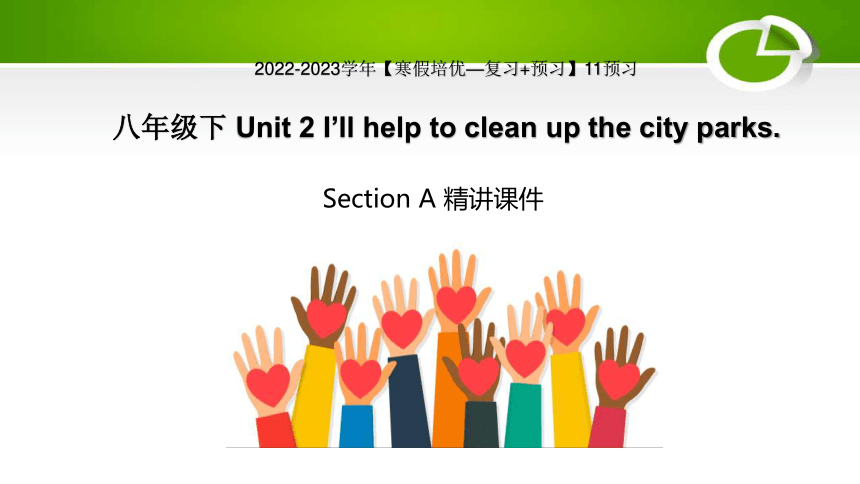 | |
| 格式 | pptx | ||
| 文件大小 | 2.3MB | ||
| 资源类型 | 教案 | ||
| 版本资源 | 人教新目标(Go for it)版 | ||
| 科目 | 英语 | ||
| 更新时间 | 2023-01-13 08:01:03 | ||
图片预览

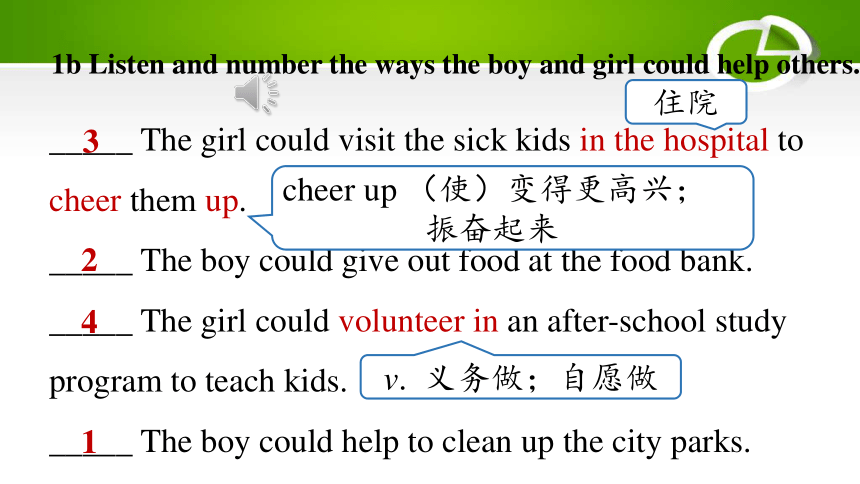
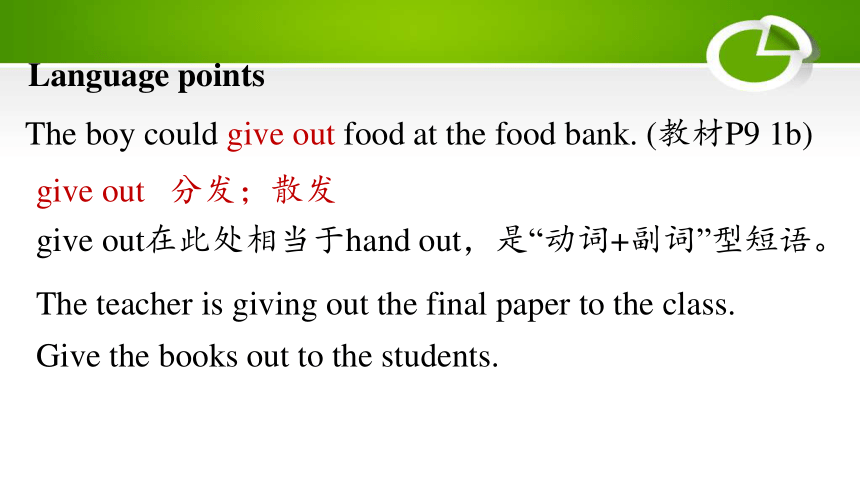

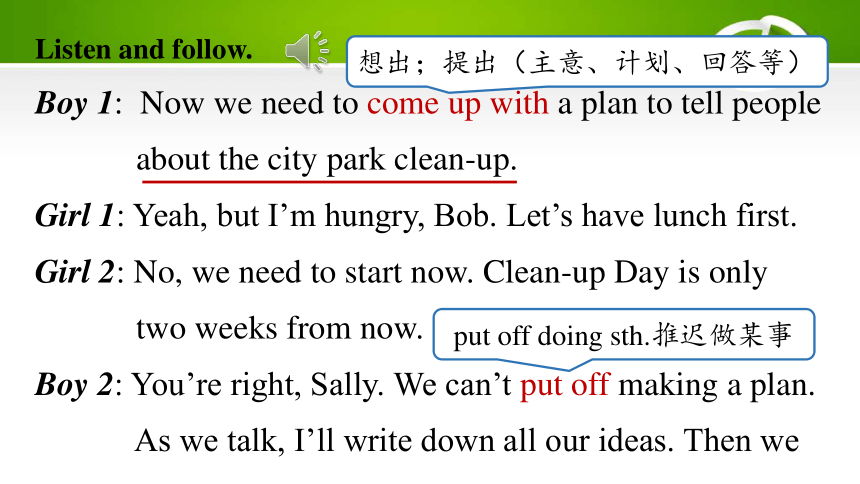
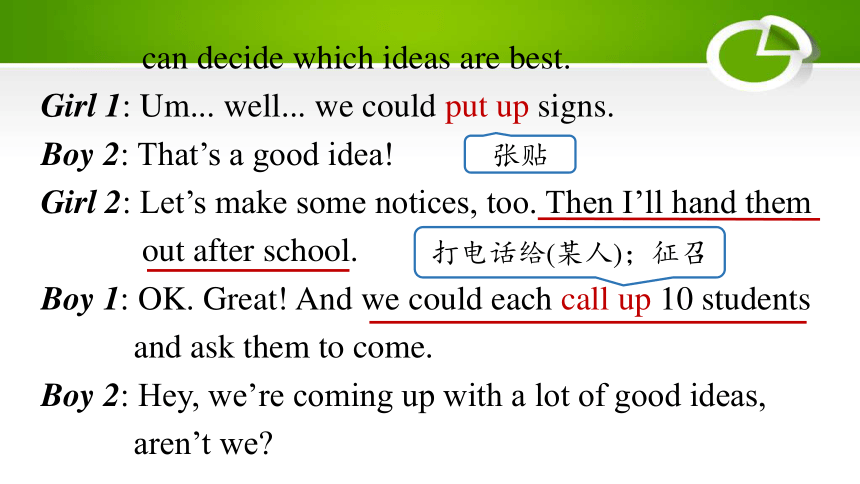
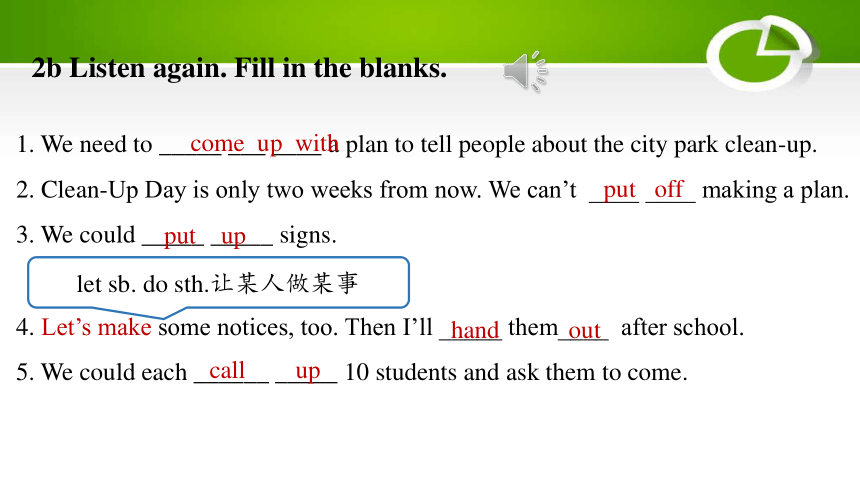
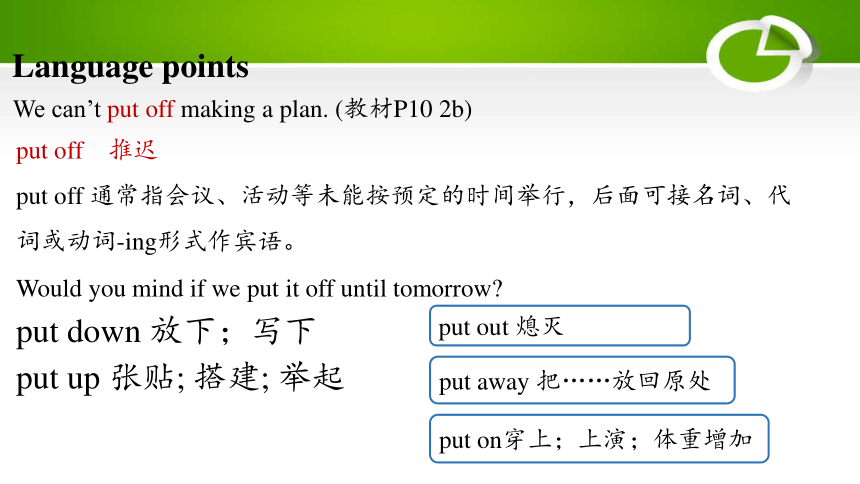

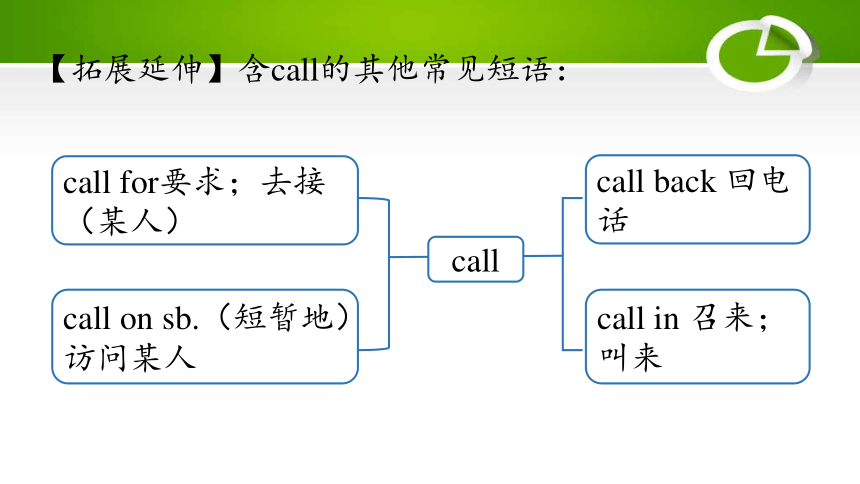
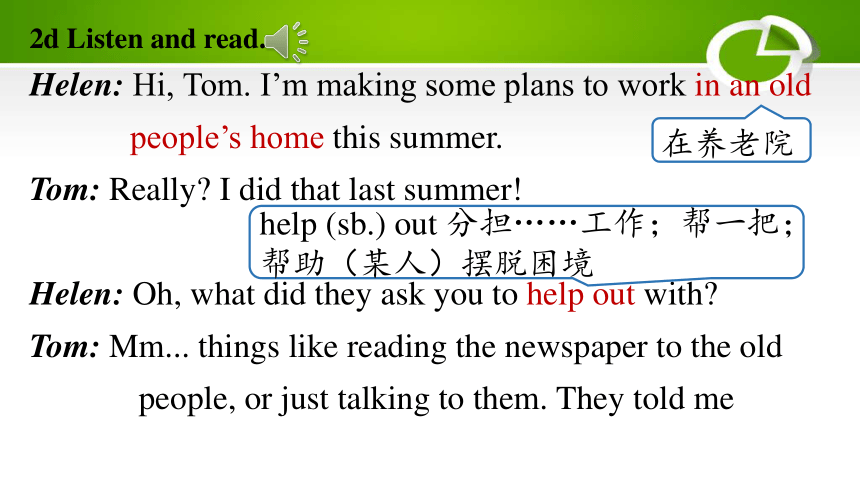
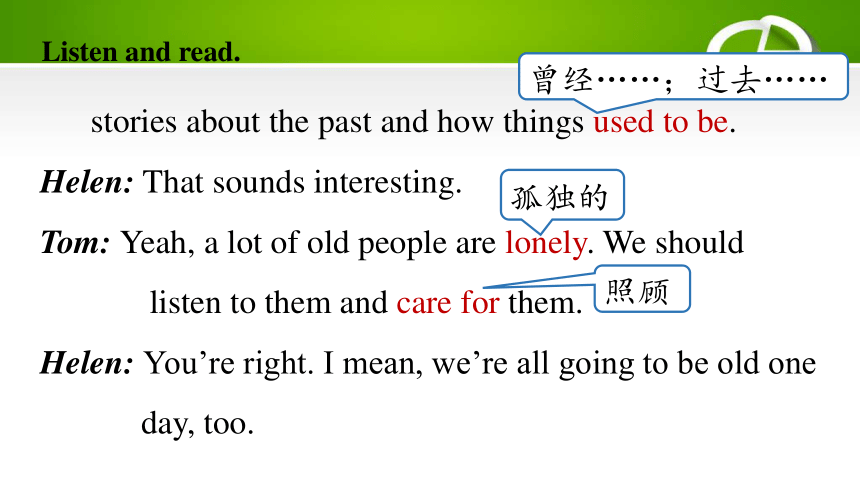
文档简介
(共46张PPT)
2022-2023学年【寒假培优—复习+预习】11预习
八年级下 Unit 2 I’ll help to clean up the city parks.
Section A 精讲课件
1b Listen and number the ways the boy and girl could help others.
_____ The girl could visit the sick kids in the hospital to cheer them up.
_____ The boy could give out food at the food bank.
_____ The girl could volunteer in an after-school study program to teach kids.
_____ The boy could help to clean up the city parks.
3
2
4
1
cheer up (使)变得更高兴;
振奋起来
v. 义务做;自愿做
住院
The boy could give out food at the food bank. (教材P9 1b)
give out在此处相当于hand out,是“动词+副词”型短语。
give out 分发;散发
The teacher is giving out the final paper to the class.
Give the books out to the students.
Language points
2a A group of students are planning a City Park Clean-Up Day. Listen and check(√) the things they are going to do to tell people about it.
a
b
c
d
e
√
√
√
Boy 1: Now we need to come up with a plan to tell people
about the city park clean-up.
Girl 1: Yeah, but I’m hungry, Bob. Let’s have lunch first.
Girl 2: No, we need to start now. Clean-up Day is only
two weeks from now.
Boy 2: You’re right, Sally. We can’t put off making a plan.
As we talk, I’ll write down all our ideas. Then we
Listen and follow.
put off doing sth.推迟做某事
想出;提出(主意、计划、回答等)
can decide which ideas are best.
Girl 1: Um... well... we could put up signs.
Boy 2: That’s a good idea!
Girl 2: Let’s make some notices, too. Then I’ll hand them
out after school.
Boy 1: OK. Great! And we could each call up 10 students
and ask them to come.
Boy 2: Hey, we’re coming up with a lot of good ideas,
aren’t we
张贴
打电话给(某人);征召
2b Listen again. Fill in the blanks.
1. We need to _____ ___ ____ a plan to tell people about the city park clean-up.
2. Clean-Up Day is only two weeks from now. We can’t ____ ____ making a plan.
3. We could _____ _____ signs.
put off
put up
come up with
4. Let’s make some notices, too. Then I’ll _____ them____ after school.
5. We could each ______ _____ 10 students and ask them to come.
call up
hand out
let sb. do sth.让某人做某事
We can’t put off making a plan. (教材P10 2b)
put off 通常指会议、活动等未能按预定的时间举行,后面可接名词、代词或动词-ing形式作宾语。
put off 推迟
Would you mind if we put it off until tomorrow
Language points
put down 放下;写下
put up 张贴; 搭建; 举起
put out 熄灭
put away 把……放回原处
put on穿上;上演;体重增加
3. We could each call up 10 students and ask them to come. (教材P10 2b)
call up 打电话给(某人);征召
I’m sorry for calling you up so late.
(1) call up在此处意为“打电话给(某人)”,是“动词+副词”型短语。
The young man was called up at the beginning of the war.
(2) call up还可意为“征召”。
call
call for要求;去接(某人)
call on sb.(短暂地)访问某人
call back 回电话
call in 召来;叫来
【拓展延伸】含call的其他常见短语:
Helen: Hi, Tom. I’m making some plans to work in an old
people’s home this summer.
Tom: Really I did that last summer!
Helen: Oh, what did they ask you to help out with
Tom: Mm... things like reading the newspaper to the old
people, or just talking to them. They told me
2d Listen and read.
help (sb.) out 分担……工作;帮一把;帮助(某人)摆脱困境
在养老院
stories about the past and how things used to be.
Helen: That sounds interesting.
Tom: Yeah, a lot of old people are lonely. We should
listen to them and care for them.
Helen: You’re right. I mean, we’re all going to be old one
day, too.
Listen and read.
曾经……;过去……
孤独的
照顾
1. They told me stories about the past and how things used
to be. (教材P10 2d)
used to 表示过去一度存在或经常发生,但现在已经不存在的动作或状态。其后接动词原形,且不与表示过去的时间状语连用。used to的否定形式是didn’t use to或used not to (usedn’t to)。
used to 曾经……;过去……
Language points
He used to get up at 5:30 in Shanghai.
He didn’t use to walk to work.
= He usedn’t to walk to work.
【拓展延伸】 be used to doing sth. 意为“习惯做某事”,to 在此处为介词。
Mario is used to volunteering at an animal hospital now.
2. ①Yeah, a lot of old people are lonely. (教材P10 2d)
②I want to travel alone. (教材P12 4c)
lonely / l nli/ adj. 孤独的;寂寞的
alone / l n/ adv. 独自;单独
The old woman lives alone, but she doesn’t feel lonely.
We came to a lonely(偏僻的) village at last.
The boy was very shy, and he was alone all the time.
lonely 形容词 意为“孤独的;寂寞的”,指情感上的孤独,带有伤感的色彩。(①句中用法) 意为“荒凉的;偏僻的”,通常用于名词前作定语。 alone 副词 意为“独自;单独”,相当于by oneself。(②句中用法) 强调没有同伴的客观情况,不含感彩。
形容词 意为“单独的;独自的”,常用作表语。 【易混辨析】lonely与alone
3. We should listen to them and care for them. (教材P10 2d)
care for 照顾;非常喜欢
The woman cared for her sick husband day and night.
(1) care for在此处意为“照顾”,相当于look after 或take care of。
He cares for chess and music.
(2) care for还可意为“非常喜欢”,常与not连用。
Fill in the blanks according to the conversation in 2d.
Helen: Hi, Tom. I’ making some plans to work in
this summer.
Tom: Really I did that last summer!
Helen: Oh, what did they ask you to with
Tom: Mm... reading the newspaper to the old people, or just talking to them. They told me stories about the past and how things .
Helen: That sounds .
an old people’s home
help out
things like
used to be
interesting
Tom: Yeah, a lot of old people are . We should listen to them and_______ them.
Helen: You’re right. I mean, we’re all going to be old one day, too.
lonely
care for
1. Mario Green and Mary Brown from Riverside High
School give up sveral hours each week to help others.
(教材P11 3a)
each /i t / det. & pron. 各个;每个
each与every,两者均可表示“每个”,但用法不同:
Each student has a toy.
They each have ten toys.
Each of them has a gift.
Every member in my family likes sports.
Language points
each 强调个性,着眼于个体。 用于单数主语前,谓语动词用单数。
用于复数主语后,谓语动词用复数。
each of 后接复数名词或代词作主语时,谓语动词用单数。
every 强调共性,着眼于整体。 用于单数主语前,谓语动词用单数。
不能与of 连用。
【特别提醒】each不能与almost、nearly、not等搭配,而every可以。
Almost every apple was red.
Not every student went to the beach in summer.
2. I get such a strong feeling of satisfaction when I see the animals get better and the look of joy on their owners’ faces. (教材P11 3a)
satisfaction / s t s f k n/ n. 满足;满意
The teacher smiled with satisfaction.
satisfaction 一般用作不可数名词。
satisfied adj. 满意的;满足的
be satisfied with
对……感到满意
satisfy v.
使满意;使满足
satisfaction n. 满意;满足
3. She could read by herself at the age of four. (教材P11 3a)
by oneself 独自地;独立地
The old man walked for a while by himself in the garden.
All the students finished their project by themselves.
by oneself 相当于 alone 或 on one’s own。
3. She could read by herself at the age of four. (教材P11 3a)
He became a writer at the age of 27 (= at age 27/at 27).
at the age of 在……岁时
at the age of 后直接跟基数词,相当于“at age+基数词”或“at+基数词”。
By the age of seven he could write beautifully.
【拓展延伸】by the age of 意为“在……岁之前;到…… 岁时”。
4. Last year, she decided to try out for a volunteer after-
school reading program. (教材P11 3a)
Why don’t you try out for the football team
try out 参加……选拔;试用
(1) try out 在此处意为“ 参加……选拔”, 与介词for连用。
Do you want to try out this new product
(2) try out还有“ 试用(某人);尝试检验(某种方法或仪器设备的实用性或运作是否正常)”的意思。
5. The kids are sitting in the library, but you can see in their eyes that they’re going on a different journey with each new book. (教材P11 3a)
journey / d ni/ n. (尤指长途)旅行;行程
journey travel trip tour
常指陆地上的远距离旅行,有时也可指“路程”。 常指长时间、远距离的“旅行”,尤指出国旅行。 常指近距离的为了办事或消遣的旅行,往往要回到出发点。 指成团的、以观光为目的的旅游,也可指明星的巡演。
I took a jonrney from Wuhan to Hefei last year.
Travel is much cheaper now than it used to be.
They took a boat trip to the island last month and had great fun there.
We took a walking tour of the small town.
6. I can do what I love to do and help others at the same time. (教材P11 3a)
at the same time 同时
【拓展延伸】time的其他常见短语:
time
all the time 一直
in time及时
from time to time不时
on time准时
at times有时
at all times随时,总是
3a Use infinitives to complete the sentences below.
1. Mario would like ______ an animal doctor.
2. Mario works for an animal hospital because he wants
________ about how ________ for animals.
3. Mary decided __________ for a job at an after-school
reading program last year. She still works there now
____________ kids learn to read.
4. Mary has a dream job because she can do what she loves
_______.
to learn
to be
to care
to do
to try out
to help
1.在我6岁时,我开始了学校生活。
_____ _____ _____ _____ six, I started my school life.
2.要实现中国梦,必须不忘初心。
To _____ _____ the Chinese dream, we must not forget our original heart.
3.他们同时到达了终点线。
They arrived at the finishing line _____ _____ _____ _____ .
At the age of
完成句子
come true
at the same
time
4.我有一种强烈的感觉,他将赢得这次英语演讲比赛。
I have a _______ _______ that he will win the English Speech Competition.
5.现在每所学校都有自己的计算机室。
Now _______ school has its own computer rooms.
strong feeling
each
I’m making some signs to put up around the school. (教材P12 Grammar Focus)
put up 张贴
At the Spring Festival, people put up “Fu” on doors or windows.
Language points
We can put up a tent under the tree.
Put up your hand if you have any question.
I’d like to put up an idea for the task.
建造,搭建
提出(建议等)
举起
常见短语动词的类型和用法
相当于及物动词,后面必须有宾语,且宾语只能位于介词之后。
look after 照顾 care for 非常喜欢;照顾look at看
think about 考虑 agree with 同意 wait for 等待
I agree with what you said.
He cared for her more than she realized.
(1)动词+介词
短语动词是由动词加介词、副词或其他词构成的固定词组或习语(idioms),其作用和动词差不多。有些短语动词相当于及物动词,有些则相当于不及物动词。
(2)动词+副词
①可看作及物动词,名词作宾语时,可位于动词与副词之间或副词之后;代词作其宾语时,只能位于动词与副词之间。
②有的也可看作不及物动词。
cheer up 振奋起来
clean up 打扫干净
give up 放弃
put off 推迟
take away 拿走
fix up 修理
turn down 调低;拒绝
This is a new word. You’d better look it up in the dictionary.
It’s too noisy. Please turn down the TV. =
It’s too noisy. Please turn the TV down.
相当于及物动词,宾语位于介词之后。
catch up with 赶上 come up with 想出
look forward to 期望 run out of 用完,耗尽
He worked hard to catch up with his classmates.
I’m looking forward to your reply.
(3)动词+副词+介词
相当于及物动词,名词前可加形容词说明程度,宾语位于介词之后。
make fun of 取笑 pay attention to 注意
make use of 利用 take care of 照顾
make friends with 与……交往
We shouldn’t make fun of your classmate.
We could make better use of the time.
(4)动词+名词+介词
1. I want to ______ my plan to work in an
animal hospital until next summer. I’m
too busy with my studies this year.
2. She hopes to _______ at least five
primary schools to ask if they need
volunteers for their after-school programs.
4a Fill in the blanks with the phrasal verbs in the box.
be busy with... 忙于,后接名词或代词
put off
call up
put up
hand out
call up
cheer up
come up with
give out
put off
3. Our class is trying to ____________ some ideas to
________ sick children because they are often sad.
4. We decided to ______ signs around the school and
________ notices to tell students about the book sale.
We will _______ the money from the sale to homeless
people.
come up with
cheer up
put up
hand out
give out
动词不定式的基本形式是“to+动词原形”,有时to可省略。它没有人称和数的变化,在句中不能作谓语。其否定形式为“not to+动词原形”。
动词不定式
动词不定式的用法
常接动词不定式作宾语的动词有:
想要 拒绝 忘记 (want, refuse, forget)
需要 努力 学习 (need, try, learn)
选择 同意 帮助 (choose, agree, help)
希望 决定 开始 (hope/wish/expect, decide,
begin/start)
Jenny wants to find a new job next year.
He decided to help the homeless.
1.动词不定式作宾语
常接动词不定式作宾补的动词有:ask, allow, tell, want, teach, wish, help, warn, invite, encourage 等。
Sam asked me to help him with the project.
The teacher always tells us not to swim in the river.
2.动词不定式作宾语补足语
动词不定式(短语)作目的状语, 可以放在句首, 一般用逗号与后面的内容隔开, 也可以放在句尾。
3.动词不定式作目的状语
动词不定式(短语)作主语时,通常表示一个具体的、特定的行为,其谓语动词用单数形式。
To see is to believe. 眼见为实。
4.动词不定式作主语
To get there on time, they started early.
动词不定式作定语时通常要放在所修饰词之后。
My duty is to look after the animals.
Who was the first one to arrive
5.动词不定式作表语
6.动词不定式作定语
使用动词不定式(短语)需要注意的几个问题
1.不定式(短语)作主语时,常由it代替它作形式主语,
而将不定式放到谓语的后面。主要有三种情况。
(1)It is +名词 + to do sth.
It’s our duty to take good care of the old.
(2)It takes sb. +some time + to do sth.
It takes us two hours to finish the work.
(3)It is+形容词(easy, important, difficult, foolish, right,
wrong...) (+for/of sb.)+ to do sth.
It is not easy to finish the work within one hour.
It is very important for young people to make friends.
It is nice of you to do that.
2.feel, find, make, think等动词后如果是不定式(短语)作宾语,且宾语补足语是形容词或名词,常用it作形式宾语,把不定式(短语)放到宾语补足语之后。
I find it necessary to do sports every week.
I think it important for us to study hard now.
3.有一些动词后用作宾语补足语的不定式(短语)通常不带to,这样的动词主要有三看 ( see, watch, notice )、三让( let, make, have )、二听( hear, listen to )、一感觉( feel )。
Did you notice her clean the house
I saw her get into the car.
His parents make him sweep the floor.
The teachers often help us (to) solve problems.
Most people today are only worried about getting good jobs _______ lots of money. In their free time, they think about what _____ for fun. However, few people think about what they can do ______ others. There are many people who are less lucky than us.
4b Fill in the blanks with the correct forms of the verbs in the box.
help move do make visit spend
to make
to do
to help
be worried about 担心……
Volunteering our time to help these people is a good way _______ our free time. For example, we can make plans _______ sick children in the hospital or raise money for homeless people. Some people even stop doing their jobs for a few months to a year _______ to another place, like one of the countries in Africa, and help people there.
to spend
to visit
to move
为……筹款
2022-2023学年【寒假培优—复习+预习】11预习
八年级下 Unit 2 I’ll help to clean up the city parks.
Section A 精讲课件
1b Listen and number the ways the boy and girl could help others.
_____ The girl could visit the sick kids in the hospital to cheer them up.
_____ The boy could give out food at the food bank.
_____ The girl could volunteer in an after-school study program to teach kids.
_____ The boy could help to clean up the city parks.
3
2
4
1
cheer up (使)变得更高兴;
振奋起来
v. 义务做;自愿做
住院
The boy could give out food at the food bank. (教材P9 1b)
give out在此处相当于hand out,是“动词+副词”型短语。
give out 分发;散发
The teacher is giving out the final paper to the class.
Give the books out to the students.
Language points
2a A group of students are planning a City Park Clean-Up Day. Listen and check(√) the things they are going to do to tell people about it.
a
b
c
d
e
√
√
√
Boy 1: Now we need to come up with a plan to tell people
about the city park clean-up.
Girl 1: Yeah, but I’m hungry, Bob. Let’s have lunch first.
Girl 2: No, we need to start now. Clean-up Day is only
two weeks from now.
Boy 2: You’re right, Sally. We can’t put off making a plan.
As we talk, I’ll write down all our ideas. Then we
Listen and follow.
put off doing sth.推迟做某事
想出;提出(主意、计划、回答等)
can decide which ideas are best.
Girl 1: Um... well... we could put up signs.
Boy 2: That’s a good idea!
Girl 2: Let’s make some notices, too. Then I’ll hand them
out after school.
Boy 1: OK. Great! And we could each call up 10 students
and ask them to come.
Boy 2: Hey, we’re coming up with a lot of good ideas,
aren’t we
张贴
打电话给(某人);征召
2b Listen again. Fill in the blanks.
1. We need to _____ ___ ____ a plan to tell people about the city park clean-up.
2. Clean-Up Day is only two weeks from now. We can’t ____ ____ making a plan.
3. We could _____ _____ signs.
put off
put up
come up with
4. Let’s make some notices, too. Then I’ll _____ them____ after school.
5. We could each ______ _____ 10 students and ask them to come.
call up
hand out
let sb. do sth.让某人做某事
We can’t put off making a plan. (教材P10 2b)
put off 通常指会议、活动等未能按预定的时间举行,后面可接名词、代词或动词-ing形式作宾语。
put off 推迟
Would you mind if we put it off until tomorrow
Language points
put down 放下;写下
put up 张贴; 搭建; 举起
put out 熄灭
put away 把……放回原处
put on穿上;上演;体重增加
3. We could each call up 10 students and ask them to come. (教材P10 2b)
call up 打电话给(某人);征召
I’m sorry for calling you up so late.
(1) call up在此处意为“打电话给(某人)”,是“动词+副词”型短语。
The young man was called up at the beginning of the war.
(2) call up还可意为“征召”。
call
call for要求;去接(某人)
call on sb.(短暂地)访问某人
call back 回电话
call in 召来;叫来
【拓展延伸】含call的其他常见短语:
Helen: Hi, Tom. I’m making some plans to work in an old
people’s home this summer.
Tom: Really I did that last summer!
Helen: Oh, what did they ask you to help out with
Tom: Mm... things like reading the newspaper to the old
people, or just talking to them. They told me
2d Listen and read.
help (sb.) out 分担……工作;帮一把;帮助(某人)摆脱困境
在养老院
stories about the past and how things used to be.
Helen: That sounds interesting.
Tom: Yeah, a lot of old people are lonely. We should
listen to them and care for them.
Helen: You’re right. I mean, we’re all going to be old one
day, too.
Listen and read.
曾经……;过去……
孤独的
照顾
1. They told me stories about the past and how things used
to be. (教材P10 2d)
used to 表示过去一度存在或经常发生,但现在已经不存在的动作或状态。其后接动词原形,且不与表示过去的时间状语连用。used to的否定形式是didn’t use to或used not to (usedn’t to)。
used to 曾经……;过去……
Language points
He used to get up at 5:30 in Shanghai.
He didn’t use to walk to work.
= He usedn’t to walk to work.
【拓展延伸】 be used to doing sth. 意为“习惯做某事”,to 在此处为介词。
Mario is used to volunteering at an animal hospital now.
2. ①Yeah, a lot of old people are lonely. (教材P10 2d)
②I want to travel alone. (教材P12 4c)
lonely / l nli/ adj. 孤独的;寂寞的
alone / l n/ adv. 独自;单独
The old woman lives alone, but she doesn’t feel lonely.
We came to a lonely(偏僻的) village at last.
The boy was very shy, and he was alone all the time.
lonely 形容词 意为“孤独的;寂寞的”,指情感上的孤独,带有伤感的色彩。(①句中用法) 意为“荒凉的;偏僻的”,通常用于名词前作定语。 alone 副词 意为“独自;单独”,相当于by oneself。(②句中用法) 强调没有同伴的客观情况,不含感彩。
形容词 意为“单独的;独自的”,常用作表语。 【易混辨析】lonely与alone
3. We should listen to them and care for them. (教材P10 2d)
care for 照顾;非常喜欢
The woman cared for her sick husband day and night.
(1) care for在此处意为“照顾”,相当于look after 或take care of。
He cares for chess and music.
(2) care for还可意为“非常喜欢”,常与not连用。
Fill in the blanks according to the conversation in 2d.
Helen: Hi, Tom. I’ making some plans to work in
this summer.
Tom: Really I did that last summer!
Helen: Oh, what did they ask you to with
Tom: Mm... reading the newspaper to the old people, or just talking to them. They told me stories about the past and how things .
Helen: That sounds .
an old people’s home
help out
things like
used to be
interesting
Tom: Yeah, a lot of old people are . We should listen to them and_______ them.
Helen: You’re right. I mean, we’re all going to be old one day, too.
lonely
care for
1. Mario Green and Mary Brown from Riverside High
School give up sveral hours each week to help others.
(教材P11 3a)
each /i t / det. & pron. 各个;每个
each与every,两者均可表示“每个”,但用法不同:
Each student has a toy.
They each have ten toys.
Each of them has a gift.
Every member in my family likes sports.
Language points
each 强调个性,着眼于个体。 用于单数主语前,谓语动词用单数。
用于复数主语后,谓语动词用复数。
each of 后接复数名词或代词作主语时,谓语动词用单数。
every 强调共性,着眼于整体。 用于单数主语前,谓语动词用单数。
不能与of 连用。
【特别提醒】each不能与almost、nearly、not等搭配,而every可以。
Almost every apple was red.
Not every student went to the beach in summer.
2. I get such a strong feeling of satisfaction when I see the animals get better and the look of joy on their owners’ faces. (教材P11 3a)
satisfaction / s t s f k n/ n. 满足;满意
The teacher smiled with satisfaction.
satisfaction 一般用作不可数名词。
satisfied adj. 满意的;满足的
be satisfied with
对……感到满意
satisfy v.
使满意;使满足
satisfaction n. 满意;满足
3. She could read by herself at the age of four. (教材P11 3a)
by oneself 独自地;独立地
The old man walked for a while by himself in the garden.
All the students finished their project by themselves.
by oneself 相当于 alone 或 on one’s own。
3. She could read by herself at the age of four. (教材P11 3a)
He became a writer at the age of 27 (= at age 27/at 27).
at the age of 在……岁时
at the age of 后直接跟基数词,相当于“at age+基数词”或“at+基数词”。
By the age of seven he could write beautifully.
【拓展延伸】by the age of 意为“在……岁之前;到…… 岁时”。
4. Last year, she decided to try out for a volunteer after-
school reading program. (教材P11 3a)
Why don’t you try out for the football team
try out 参加……选拔;试用
(1) try out 在此处意为“ 参加……选拔”, 与介词for连用。
Do you want to try out this new product
(2) try out还有“ 试用(某人);尝试检验(某种方法或仪器设备的实用性或运作是否正常)”的意思。
5. The kids are sitting in the library, but you can see in their eyes that they’re going on a different journey with each new book. (教材P11 3a)
journey / d ni/ n. (尤指长途)旅行;行程
journey travel trip tour
常指陆地上的远距离旅行,有时也可指“路程”。 常指长时间、远距离的“旅行”,尤指出国旅行。 常指近距离的为了办事或消遣的旅行,往往要回到出发点。 指成团的、以观光为目的的旅游,也可指明星的巡演。
I took a jonrney from Wuhan to Hefei last year.
Travel is much cheaper now than it used to be.
They took a boat trip to the island last month and had great fun there.
We took a walking tour of the small town.
6. I can do what I love to do and help others at the same time. (教材P11 3a)
at the same time 同时
【拓展延伸】time的其他常见短语:
time
all the time 一直
in time及时
from time to time不时
on time准时
at times有时
at all times随时,总是
3a Use infinitives to complete the sentences below.
1. Mario would like ______ an animal doctor.
2. Mario works for an animal hospital because he wants
________ about how ________ for animals.
3. Mary decided __________ for a job at an after-school
reading program last year. She still works there now
____________ kids learn to read.
4. Mary has a dream job because she can do what she loves
_______.
to learn
to be
to care
to do
to try out
to help
1.在我6岁时,我开始了学校生活。
_____ _____ _____ _____ six, I started my school life.
2.要实现中国梦,必须不忘初心。
To _____ _____ the Chinese dream, we must not forget our original heart.
3.他们同时到达了终点线。
They arrived at the finishing line _____ _____ _____ _____ .
At the age of
完成句子
come true
at the same
time
4.我有一种强烈的感觉,他将赢得这次英语演讲比赛。
I have a _______ _______ that he will win the English Speech Competition.
5.现在每所学校都有自己的计算机室。
Now _______ school has its own computer rooms.
strong feeling
each
I’m making some signs to put up around the school. (教材P12 Grammar Focus)
put up 张贴
At the Spring Festival, people put up “Fu” on doors or windows.
Language points
We can put up a tent under the tree.
Put up your hand if you have any question.
I’d like to put up an idea for the task.
建造,搭建
提出(建议等)
举起
常见短语动词的类型和用法
相当于及物动词,后面必须有宾语,且宾语只能位于介词之后。
look after 照顾 care for 非常喜欢;照顾look at看
think about 考虑 agree with 同意 wait for 等待
I agree with what you said.
He cared for her more than she realized.
(1)动词+介词
短语动词是由动词加介词、副词或其他词构成的固定词组或习语(idioms),其作用和动词差不多。有些短语动词相当于及物动词,有些则相当于不及物动词。
(2)动词+副词
①可看作及物动词,名词作宾语时,可位于动词与副词之间或副词之后;代词作其宾语时,只能位于动词与副词之间。
②有的也可看作不及物动词。
cheer up 振奋起来
clean up 打扫干净
give up 放弃
put off 推迟
take away 拿走
fix up 修理
turn down 调低;拒绝
This is a new word. You’d better look it up in the dictionary.
It’s too noisy. Please turn down the TV. =
It’s too noisy. Please turn the TV down.
相当于及物动词,宾语位于介词之后。
catch up with 赶上 come up with 想出
look forward to 期望 run out of 用完,耗尽
He worked hard to catch up with his classmates.
I’m looking forward to your reply.
(3)动词+副词+介词
相当于及物动词,名词前可加形容词说明程度,宾语位于介词之后。
make fun of 取笑 pay attention to 注意
make use of 利用 take care of 照顾
make friends with 与……交往
We shouldn’t make fun of your classmate.
We could make better use of the time.
(4)动词+名词+介词
1. I want to ______ my plan to work in an
animal hospital until next summer. I’m
too busy with my studies this year.
2. She hopes to _______ at least five
primary schools to ask if they need
volunteers for their after-school programs.
4a Fill in the blanks with the phrasal verbs in the box.
be busy with... 忙于,后接名词或代词
put off
call up
put up
hand out
call up
cheer up
come up with
give out
put off
3. Our class is trying to ____________ some ideas to
________ sick children because they are often sad.
4. We decided to ______ signs around the school and
________ notices to tell students about the book sale.
We will _______ the money from the sale to homeless
people.
come up with
cheer up
put up
hand out
give out
动词不定式的基本形式是“to+动词原形”,有时to可省略。它没有人称和数的变化,在句中不能作谓语。其否定形式为“not to+动词原形”。
动词不定式
动词不定式的用法
常接动词不定式作宾语的动词有:
想要 拒绝 忘记 (want, refuse, forget)
需要 努力 学习 (need, try, learn)
选择 同意 帮助 (choose, agree, help)
希望 决定 开始 (hope/wish/expect, decide,
begin/start)
Jenny wants to find a new job next year.
He decided to help the homeless.
1.动词不定式作宾语
常接动词不定式作宾补的动词有:ask, allow, tell, want, teach, wish, help, warn, invite, encourage 等。
Sam asked me to help him with the project.
The teacher always tells us not to swim in the river.
2.动词不定式作宾语补足语
动词不定式(短语)作目的状语, 可以放在句首, 一般用逗号与后面的内容隔开, 也可以放在句尾。
3.动词不定式作目的状语
动词不定式(短语)作主语时,通常表示一个具体的、特定的行为,其谓语动词用单数形式。
To see is to believe. 眼见为实。
4.动词不定式作主语
To get there on time, they started early.
动词不定式作定语时通常要放在所修饰词之后。
My duty is to look after the animals.
Who was the first one to arrive
5.动词不定式作表语
6.动词不定式作定语
使用动词不定式(短语)需要注意的几个问题
1.不定式(短语)作主语时,常由it代替它作形式主语,
而将不定式放到谓语的后面。主要有三种情况。
(1)It is +名词 + to do sth.
It’s our duty to take good care of the old.
(2)It takes sb. +some time + to do sth.
It takes us two hours to finish the work.
(3)It is+形容词(easy, important, difficult, foolish, right,
wrong...) (+for/of sb.)+ to do sth.
It is not easy to finish the work within one hour.
It is very important for young people to make friends.
It is nice of you to do that.
2.feel, find, make, think等动词后如果是不定式(短语)作宾语,且宾语补足语是形容词或名词,常用it作形式宾语,把不定式(短语)放到宾语补足语之后。
I find it necessary to do sports every week.
I think it important for us to study hard now.
3.有一些动词后用作宾语补足语的不定式(短语)通常不带to,这样的动词主要有三看 ( see, watch, notice )、三让( let, make, have )、二听( hear, listen to )、一感觉( feel )。
Did you notice her clean the house
I saw her get into the car.
His parents make him sweep the floor.
The teachers often help us (to) solve problems.
Most people today are only worried about getting good jobs _______ lots of money. In their free time, they think about what _____ for fun. However, few people think about what they can do ______ others. There are many people who are less lucky than us.
4b Fill in the blanks with the correct forms of the verbs in the box.
help move do make visit spend
to make
to do
to help
be worried about 担心……
Volunteering our time to help these people is a good way _______ our free time. For example, we can make plans _______ sick children in the hospital or raise money for homeless people. Some people even stop doing their jobs for a few months to a year _______ to another place, like one of the countries in Africa, and help people there.
to spend
to visit
to move
为……筹款
同课章节目录
- Unit 1 What's the matter?
- Section A
- Section B
- Unit 2 I'll help to clean up the city parks.
- Section A
- Section B
- Unit 3 Could you please clean your room?
- Section A
- Section B
- Unit 4 Why don't you talk to your parents?
- Section A
- Section B
- Unit 5 What were you doing when the rainstorm came
- Section A
- Section B
- Review of Units 1-5
- Unit 6 An old man tried to move the mountains.
- Section A
- Section B
- Unit 7 What's the highest mountain in the world?
- Section A
- Section B
- Unit 8 Have you read Treasure Island yet?
- Section A
- Section B
- Unit 9 Have you ever been to a museum?
- Section A
- Section B
- Unit 10 I've had this bike for three years.
- Section A
- Section B
